SDLXLIFF (SDL Trados Studio XLIFF) files
memoQ imports SDLXLIFF files, created by SDL Trados Studio 2009 and higher.
SDLXLIFF files are XLIFF files, but with extra contents that are used by SDL Trados Studio only.
Use this window to tell memoQ how to import an SDLXLIFF file. memoQ can take the following information from an SDLXLIFF file:
- States - segment statuses from Trados Studio are mapped to segment statuses in memoQ
- Additional comments - comments in Trados Studio
- Tracked changes - Trados Studio documents may contain tracked changes (similarly to Microsoft Word or memoQ documents). memoQ can import and export the markup.
- Translation quality assessment - Structured feedback in Trados Studio may be imported as Linguistic Quality Assurance (LQA) feedback (but only if you import SDLXLIFF documents as part of Trados Studio packages)
How to get here
- Start importing an SDLXLIFF document.
- In the Document import options window, select the SDLXLIFF files, and click Change filter and configuration.
-
The Document import settings window appears. From the Filter drop-down list, choose SDLXLIFF filter
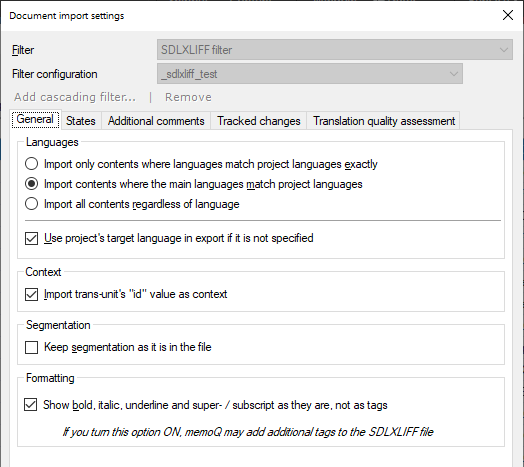
What can you do?
SDLXLIFF files can be multilingual. In addition, the languages in the SDLXLIFF file may be different from the languages of the project.
Normally, memoQ looks for the main languages of the project in the SDLXLIFF file. If they are found, memoQ imports the text that belongs to those languages. But the sublanguages can be different in the project and the SDLXLIFF file.
- This can be a problem if the SDLXLIFF file has different sublanguages of the same main language (such as US English and UK English). In this case, memoQ won't know which one to import.
- Another problem is if the SDLXLIFF file doesn't have one or more of the languages of the project.
To sort this out: Use the radio buttons on the General tab, under Languages:
- To import only those parts where even the sublanguages are the same as in the project: Click the Import only content where languages match project languages exactly radio button.
- To import every unit from the SDLXLIFF file, regardless of the languages: Click the Import all content regardless of language radio button.
To export the translation with the correct target language code: The target-language segments may be missing from the SDLXLIFF file. When these are translated, memoQ exports them with the target language of the project. If, for any reason, you need to keep the language codes in the SDLXLIFF file after export, clear the Use project's target language in export if it is not specified check box.
To import context into memoQ: SDLXLIFF documents are special XML files. Each segment is stored in a <trans-unit> element that has a numeric identifier in the id attribute. In the Context section, check the Import trans-unit's "id" value as context check box. If you don't do that, memoQ won't be able to return context matches from the translation memories when you translate SDLXLIFF documents.
Some SDLXLIFF files (typically the source files in SDLPPX packages) are "not segmented" - their <trans-unit> elements only have <source> (and usually also <seg-source>) nodes, but they do not have <target> and <sdl:seg-defs> nodes. When you open such a file in SDL Studio, it "segments" the file.
memoQ can import unsegmented SDLXLIFF files, and during import, it warns you that the file is unsegmented. If you use such a file, you can split and join segments in the translation editor as needed.
When importing a segmented SDLXLIFF file, memoQ normally allows splitting and joining segments. To make sure that segmentation stays the same as in the original: Under Segmentation, check the Keep segmentation as it is in the file check box.
The segment statuses in SDL Trados Studio are a bit different from the statuses in memoQ.
When memoQ finds a segment status in the SDLXLIFF document, it needs to know what status to use in the memoQ segment.
Use the States tab to set this up.
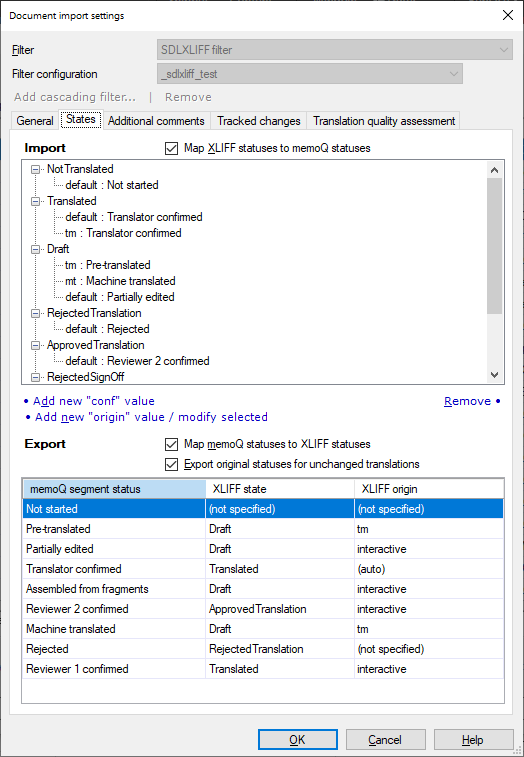
This step is called mapping.
Normally, memoQ interprets the SDLXLIFF segment statuses, and the status of segments in memoQ will be correct.
Don't change the mapping unless absolutely necessary: You can change the mapping. But don't do that unless you need different segment statuses in memoQ.
In the Import section, check the Map XLIFF statuses to memoQ statuses check box. In the list below, you see the default states mapping. Click Add new "conf" value to add a new state:
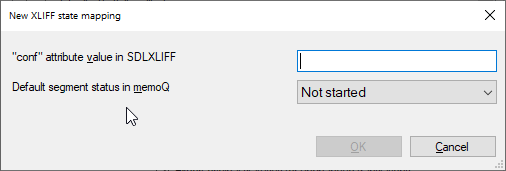
Enter a <conf> value in the text field next to "conf" attribute value in SDLXLIFF. Choose a state in the dropdown for Default segment status in memoQ. You can choose: Not started. Translator confirmed, Reviewer 1 confirmed, Reviewer 2 confirmed, Assembled from fragments, Partially edited, Pre-translated, Rejected, or Machine Translated.
After you created a new <conf> value, you can add a new <origin> value to it or modify it. Click the Add new "origin" value / modify selected command link:
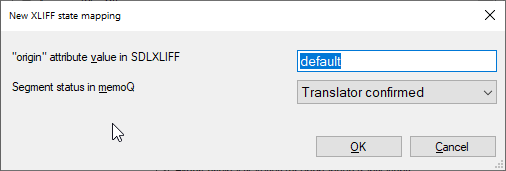
Enter an <origin> value in the text field next to "origin" attribute value in SDLXLIFF. Choose a state in the dropdown for Segment status in memoQ. You can choose: Not started, Translator confirmed, Reviewer 1 confirmed, Reviewer 2 confirmed, Assembled from fragments, Partially edited, Pre-translated, Rejected or Machine Translated.
Click the Remove command link to remove a state and its mapping.
When you export the SDLXLIFF file - or when you generate the SDL return package, memoQ does the following:
- it keeps the state, origin and match rate in the exported file,
- it keeps the current status and match rate in the memoQ document,
- it identifies the differences in the original target and the current target segment.
memoQ knows how to export the segment statuses for SDL Trados Studio: Don't change these settings unless absolutely necessary.
To export segment statuses, or to change how they are exported in the SDLXLIFF document:
- Click the States tab.
- Under Export, check the Map memoQ statuses to XLIFF statuses check box.
- In the list at the bottom of the dialog, you can see the default mapping.
If the Export original statuses for unchanged translations check box is checked, memoQ exports the exact same metadata for those segments that were not changed in memoQ. Don't clear this check box if you need to return your work to your client who uses SDL Trados Studio.
Some status information in SDLXLIFF doesn't exist in the memoQ segment statuses. This information can be imported in the form of comments.
To set this up, click the Additional comments tab. You can choose which statuses are imported, and what the comment should be.
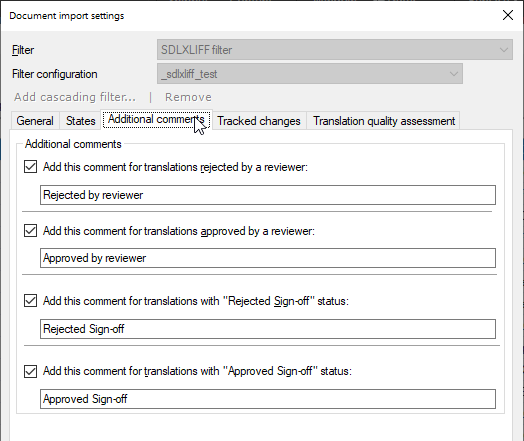
Normally, memoQ imports all information, and uses the following comments:
- Add this comment for translations rejected by a reviewer: memoQ will append this to the comment field in memoQ.
- Add this comment for translations rejected by a reviewer: memoQ will append this to the comment field in memoQ.
- Add this comment for translations with "Rejected sign-off" status: memoQ will append this to the comment field in memoQ.
- Add this comment for translations with "Approved sign-off" status: memoQ will append this to the comment field in memoQ.
The appended text will be displayed in triple hash marks, e.g. ###Rejected by reviewer###.
These comments aren't exported: When you export the file, the appended text in the comment will be skipped.
You can split and join segments in SDLXLIFF files.
Comments are imported and exported: memoQ always imports SDLXLIFF comments if there are any in the SDLXLIFF file. memoQ always exports SDLXLIFF comments.
memoQ adds user and timestamp to exported comments: When SDLXLIFF comments are converted to memoQ comments, the user and timestamp information will be converted to memoQ user and timestamp information, and vice versa.
When you import an SDLXLIFF document, the "g" tags from the SDLXLIFF files appear as special tags. The tag information gets in the memoQ tag catalog, and you will also see if a tag is open, close, or empty.
If the original file that was imported into SDL Studio was a DOC or DOCX file: Bold, italic, underline, subscript, and superscript formatting is displayed correctly memoQ. You can change them freely. This also works if the original document was in any other MS Office format (XLS, XLSX, PPT, PPTX, RTF).
An SDLXLIFF file from SDL Trados Studio needs to be imported into memoQ, and exported back to SDLXLIFF, without losing anything. memoQ uses a hard-coded mapping between SDLXLIFF and memoQ comments:
- A file-level SDLXLIFF comment will always become a document-level memoQ comment.
- A segment-level SDLXLIFF comment will always become a target-level memoQ comment.
- A selection-level SDLXLIFF comment will always become a selection-level memoQ comment.
- An Error type SDLXLIFF comment will always become an Error type memoQ comment.
- A Warning type SDLXLIFF comment will always become a Warning type memoQ comment.
- A FYI type SDLXLIFF comment will always become an Information type memoQ comment.
In memoQ, there are more comment types than in SDL Trados Studio. memoQ uses hard-coded settings to export these, too:
- A document-level memoQ comment is exported as a file-level SDLXLIFF comment.
- Row-level, source-level or target-level memoQ comments (any of the three) is exported as a segment-level SDLXLIFF comment.
- A selection-level memoQ comment is exported as a selection-level SDLXLIFF comment.
- An Error type memoQ comment is exported as an Error type SDLXLIFF comment.
- A Warning type memoQ comment is exported as a Warning type SDLXLIFF comment.
- An Information type memoQ comment is exported as a FYI type SDLXLIFF comment.
- Other type memoQ comments are not exported.
If an SDLXLIFF document contains tracked changes, memoQ can import them as tracked changes. SDLXLIFF documents are similar to memoQ XLIFF documents, and they usually contain the tracked changes in the target segments.
memoQ also imports tracked changes in the source text. These will be exported unmodified, no matter what setting you choose under Export tracked changes - those settings apply to the target side.
To choose how memoQ treats this, click the Tracked changes tab.
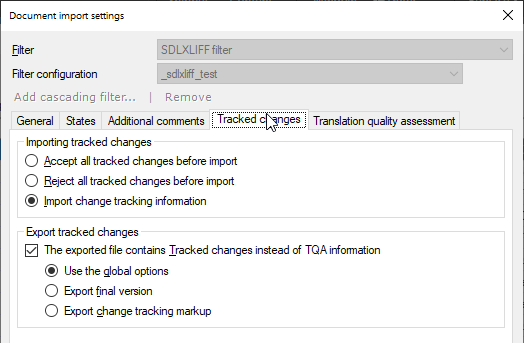
First, tell memoQ how it should import tracked changes. Most of the time, this means tracked changes in the target text.
- Normally, memoQ will import the final version only - as if all changes were accepted. This is the Accept all tracked changes before import radio button.
- To import the unedited version - as if all changes were rejected: Click Reject all tracked changes before import.
- To import the tracking markup - to see how the document was edited: Click Import change tracking information. In the translation editor, the document will look like this:

Then, tell memoQ how it should export tracked changes from the target text. This is completely independent from tracked changes in the source text. If you want to send tracked changes back to Trados Studio as tracked changes - and not as Translation Quality Assessment (TQA) feedback -, check the The exported file contains Tracked changes instead of TQA information check box. Then choose one of these options:
- Normally, memoQ uses the options that you set in the Miscellaneous pane of the Options window. In the Miscellaneous pane, click the Import/export tab. This is the Use the global options radio button.
- To export the final version - with all changes accepted: Click Export final version.
- To export the tracking markup - to see what was changed: Click Export change tracking markup.
Similarly to Linguistic Quality Assurance (LQA) in memoQ, Trados Studio can add structured feedback to translations. In Trados Studio, this is called Translation Quality Assessment (TQA).
This works when you import a Trados Studio (SDLPPX) package: memoQ can import TQA information from SDLPPX packages, but not from individual SDLXLIFF files. This section is here in the Help because you need it to set up SDLXLIFF import when you are importing a Trados Studio package.
To control that, click the Translation quality assessment tab:
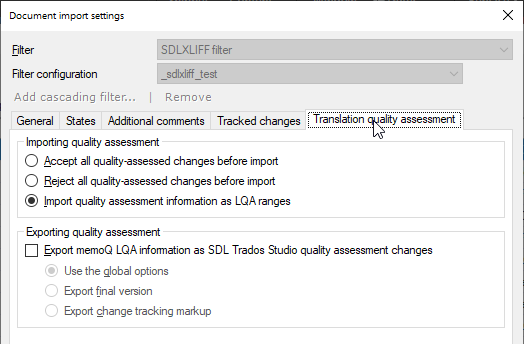
Basically, memoQ can convert TQA information into its own LQA warnings. And, when it exports the SDLXLIFF document, it can export LQA warnings in the form of TQA feedback.
First, tell memoQ how it should import TQA feedback.
- Normally, memoQ will import the documents as if all feedback were accepted. (In Studio, you can accept or reject TQA feedback.) This is the Accept all quality-assessed changes before import radio button.
- To import the documents as if all feedback were rejected: Click Reject all quality-assessed changes before import.
- To import the feedback in the form of LQA warnings (and score ranges): Click Import quality assessment information as LQA ranges.
When you work on this document (more precisely, on this package), you may add Linguistic Quality Assurance (LQA) warnings to the documents. You need to tell memoQ how it should export these warnings. This can be completely independent from the quality-assessed feedback that was originally imported with the package. If you want to send LQA warnings back to Trados Studio in the form of TQA feedback, check the Export memoQ LQA information as Trados quality assessment changes check box. Then choose one of these options:
- Normally, memoQ uses the options that you set in the Miscellaneous pane of the Options window. In the Miscellaneous pane, click the Import/export tab. This is the Use the global options radio button.
- To export the final version - without the LQA information: Click Export final version.
- To export the TQA information - to see the feedback: Click Export change tracking markup. (The text in the window needs to be corrected.)
When you finish
To confirm the settings, and return to the Document import options window: Click OK.
To return the Document import options window, and not change the filter settings: Click Cancel.
In the Document import options window: Click OK again to start importing the documents.